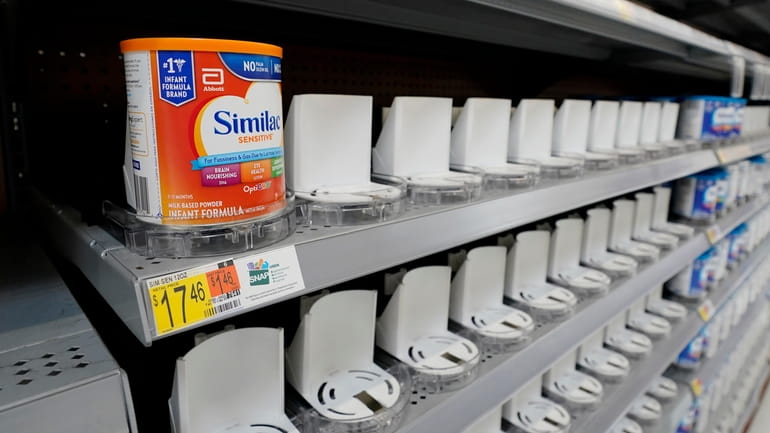Baby formula crisis born from lack of oversight

Shelves typically stocked with baby formula sit mostly empty at a store in San Antonio, Texas, on May 10. Credit: AP/Eric Gay
Parents of newborns are on a desperate search. Something once taken for granted is in short supply.
They've tried everything to find the now-elusive baby formula, from brick-and-mortar stores to online searches and even the so-called "Amazon hack," where parents have played with the online retailer's settings to feign residence in Canada.
Colostrum, the first breast milk new mothers produce, has long been called "liquid gold," for its color and the nutrients it provides. But right now, baby formula is just as valuable to parents who have no other way to feed their babies.
That's because the baby formula shortage, initially spurred by a recall at Abbott Laboratories, combined with supply-chain problems and an industry with too few players, has reached crisis levels. There appears to be no quick solution. The news Tuesday that Abbott had reached an agreement with the Food and Drug Administration to reopen its plant in Sturgis, Michigan, didn't ease fears, as it'll take weeks before shelves are restocked.
In the meantime, federal and local officials seem stuck, promising to help, but with few solutions.
And if those promises seem too little too late, there's good reason.
The baby formula industry has become greatly consolidated and enormously powerful. Abbott, which produces the Similac brand, has a grip on more than 40% of the market and in many states is the exclusive formula provider for families who receive supplemental nutrition benefits. Three other companies join Abbott as the major formula producers in the United States, making 90% of what's bought and sold.
Their collective lobbying power, combined with the unique need for their product, seems to have led to less regulatory scrutiny and accountability.
At the same time, the advocacy surrounding feeding newborns and supporting new parents often spotlights the benefits of breastfeeding, at times even discouraging the use of formula. Until now, it seems there has been less attention on formula suppliers, the industry's consolidation and the lack of strong oversight coming from federal regulators.
The FDA heavily regulates formula, so most of what's produced internationally can't be sold or bought here, in part to protect the American monopoly. Federal officials have begun easing those restrictions now to address the supply crunch.
At the same time, the regulator also lacks sufficient oversight over the American giants. Published reports indicate that Abbott lacked the appropriate controls at its Michigan plant, and that the FDA was slow to respond to a whistleblower who sounded the alarm in October about safety concerns at the plant. FDA Commissioner Robert Califf since has said he doesn't have enough staff devoted to the formula industry. That's a pretty sad excuse, one that parents trying to feed their newborns don't want to hear.
The mess has left parents in a tough spot. The same monopoly that can't fill their babies' bellies is telling them there's no real alternative. On Tuesday, the American Academy of Pediatrics suggested whole cow's milk could be used when necessary for babies six months old and older. But the messaging keeps shifting, and many parents don't know what to do.
For now, the desperate search for another scoop of powder or a can of what for many is the current liquid gold, continues. But even once the immediate crisis ends and formula is back on the shelves, regulators, advocates and others mustn't lose sight of the needs of parents and their babies, however they're fed.
Columnist Randi F. Marshall's opinions are her own.

